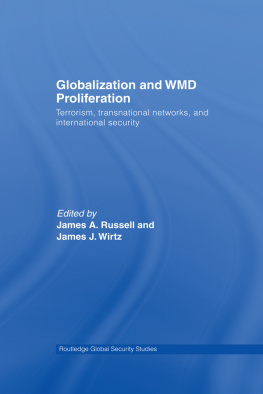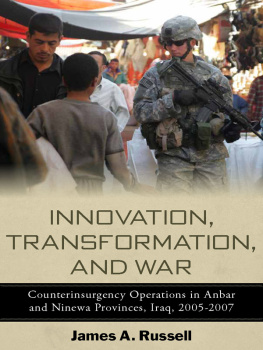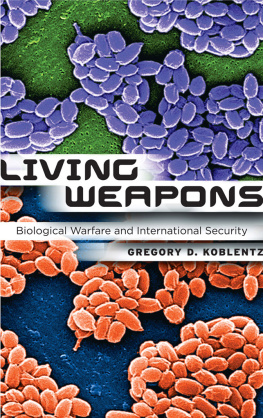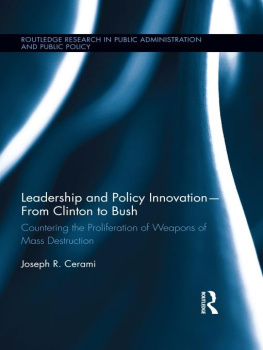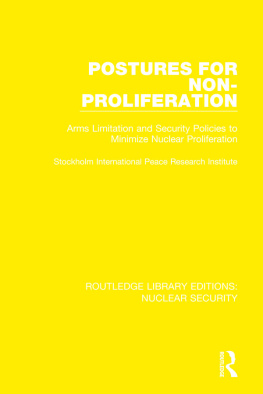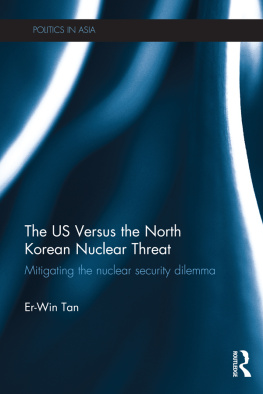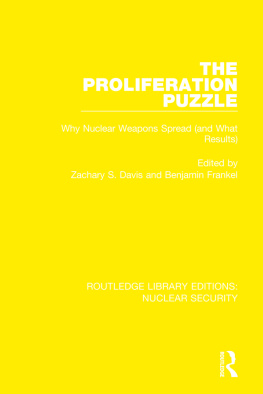Globalization and WMD Proliferation
This edited volume explores the relationship between the accelerating process of globalization and the proliferation of weapons of mass destruction (WMD), which is increasingly seen as the pre-eminent threat to international security.
The proliferation of WMD has traditionally been seen as a function of the security dilemma in the state-based international system. But the advent of the nuclear supply network pieced together by the Pakistani scientist A.Q. Khan represented a departure from this model, involving a variety of organizations not directly connected to a state. This volume assembles an international group of experts in order to assess the relationship between proliferation and globalization to ascertain how contemporary communication, transportation, and financial networks are facilitating or constraining trade in dangerous contraband. This book ultimately seeks to determine whether globalization is fundamentally altering the nature of the proliferation problem, particularly the threat that WMD might fall into the hands of terrorists.
This book will be of much interest to students of nuclear proliferation, international security, terrorism, and international relations (IR) in general.
James A. Russell is a Senior Lecturer in the Department of National Security Affairs at the Naval Postgraduate School, Monterey, California. James J. Wirtz is Professor of Strategy in the Department of National Security Affairs, Naval Postgraduate School, Monterey, California.
Routledge global security studies
Series editors: Aaron Karp, Regina Karp, and Terry Teriff
1 Nuclear Proliferation and International Security
Sverre Lodgaard and Morten Bremer Maerli
2 Global Insurgency and the Future of Armed Conflict
Debating fourth-generation warfare
Terry Terriff, Aaron Karp and Regina Karp
3 Terrorism and Weapons of Mass Destruction
Responding to the challenge
Edited by Ian Bellany
4 Globalization and WMD Proliferation
Terrorism, transnational networks, and international security
Edited by James A. Russell and James J. Wirtz
First published 2008
by Routledge
2 Park Square, Milton Park, Abingdon, Oxon OX14 4RN
Simultaneously published in the USA and Canada
by Routledge
711 Third Ave, New York, NY 10017
Routledge is an imprint of the Taylor & Francis Group, an informa business
2008 Selection and editorial matter, James A. Russell and James J. Wirtz; individual chapters, the contributors
Typeset in Times by Wearset Ltd, Boldon, Tyne and Wear
All rights reserved. No part of this book may be reprinted or reproduced or utilized in any form or by any electronic, mechanical, or other means, now known or hereafter invented, including photocopying and recording, or in any information storage or retrieval system, without permission in writing from the publishers.
British Library Cataloguing in Publication Data
A catalogue record for this book is available from the British Library
Library of Congress Cataloging in Publication Data
A catalog record for this book has been requested
ISBN10: 0-415-43394-0 (hbk)
ISBN10: 0-203-93325-7 (ebk)
ISBN13: 978-0-415-43394-5 (hbk)
ISBN13: 978-0-203-93325-1 (ebk)
David Albright is a physicist and the President of the Institute for Science and International Security (ISIS) in Washington, DC. He regularly publishes and conducts scientific research and has written numerous assessments on secret nuclear weapons programs throughout the world. He is a co-editor and contributor to Challenges of Fissile Material Control and Solving the North Korean Nuclear Puzzle (ISIS Press, 1999 and 2000, respectively). Mr Albright cooperated actively with the IAEA Action Team from 1992 to 1997, and in 1996 he was the first non-governmental inspector of the Iraqi nuclear program. Prior to founding ISIS, he worked as a Senior Staff Scientist at the Federation of American Scientists and as a member of the research staff of Princeton Universitys Center for Energy and Environmental Studies. He has served at the Environmental Policy Institute, the Congressional Research Service, the International Task Force on Prevention of Nuclear Terrorism, Los Alamos National Laboratory, and the International Atomic Energy Agency.
William W. Browne III is a Major in the United States Air Force. He holds a BA from the University of Washington and graduated from the Naval Postgraduate School in 2006 with an MA in National Security Affairs with an emphasis in Homeland Security and Defense.
John P. Caves, Jr, has been a Senior Research Professor in the National Defense Universitys Center for the Study of Weapons of Mass Destruction since 2003. Nuclear and chemical weapons threats have been the primary focus of his work at the Center. Previously, Mr Caves served as the Deputy Director for Counter-proliferation Policy (CPP) in the Office of the Secretary of Defense (OSD). There he played a leading role in preparing US forces for biological and chemical weapons threats in the Persian Gulf region and Korea, including in the development of anthrax and smallpox vaccination policies and securing enhanced capabilities against novel chemical threats. Mr Caves has twice been awarded the Secretary of Defense Medal for Meritorious Civilian Service: in 2003 for his achievements as Deputy Director, Counterproliferation Policy, and in 1999 for his contributions as Country Director for Turkey, Spain, and Cyprus in the Office of European Policy, OSD.
H. H. Gaffney is the Director of the Strategy and Concepts Team in the Center for Strategic Studies (CSS) at The Center for Naval Analyses (CNA). Dr Gaffney served for 28 years in the Office of the US Secretary of Defense prior to joining CNA, working on NATO nuclear weapons matters, including three years (19671970) at the US Mission to NATO in Brussels. After two years as Director of the Near East and South Asia office, he spent most of the 1980s as the Director of Plans in the Defense Security Assistance Agency, which managed US arms sales and security assistance programs throughout the world. Dr Gaffney received his undergraduate degree from Harvard College in 1956 and his doctorate from Columbia University in 1967 where he specialized in the politics of the developing areas. He served as an officer in the US Navy from 1956 to 1959 on destroyers in the Pacific and was the recipient of two Defense Distinguished Service medals and one Defense Meritorious Service medal.
Dennis M. Gormley is a Senior Fellow at the Monterey Institutes Center for Nonproliferation Studies in Washington, DC. He is also a Senior Lecturer on the faculty of the Graduate School of Public and International Affairs at the University of Pittsburgh and a Research Associate at the Universitys Ridgway Center for International Security Studies. He frequently furnishes expert testimony to Congress and has served as a consultant to Sandia National Laboratories and The RAND Corporation, among many others. He is the author of three books, including Dealing with the Threat of Cruise Missiles (Oxford University Press, 2001), and has contributed frequently to leading journals and newspapers internationally.

